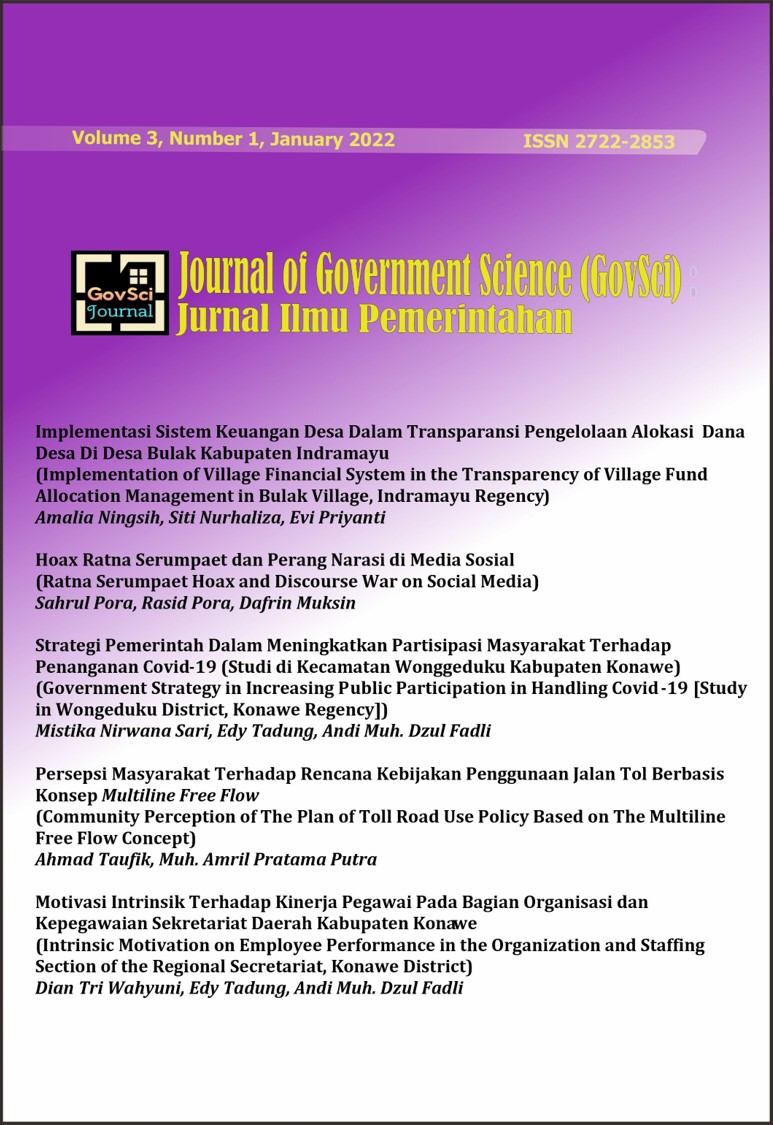Implementasi sistem keuangan desa dalam transparansi pengelolaan Alokasi Dana Desa di Desa Bulak Kabupaten Indramayu Implementation of village financial system in the transparency of village Fund Allocation Management in Bulak Village, Indramayu Regency
Abstract
The current government prioritizes village development because of the village law that places villages at the forefront of development. Villages are given sources of funds and the authority to manage them themselves in order to improve community welfare. In managing village fund sources, the Government provides a policy for implementing the Village Financial System Application (SISKEUDES). The Village Financial System Application (SISKEUDES) is an application developed by the Financial and Development Supervisory Agency (BPKP) in order to improve the quality of village financial governance. The basis for the government to make a village fund application is Law Number 6 of 2014 concerning Villages. Villages are given the opportunity to pay for their own government administration, expenditures and carry out development to improve the welfare and quality of life of the village community. Management of Village Fund Allocation is very prone to manipulation so that SISKEUDES is considered capable of having a positive impact in terms of village financial management and village funds, besides that, SISKEUDES is also considered to have an impact in terms of time and cost, so as to create a village fund management system. which is transparency and accountability.
References
Bakker, A. (1986). Metode-metode filsafat. Ghalia Indonesia.
Harmiati, H., Alexsander, A., Triyanto, D., Maya, M., & Riastuti, F. (2020). Analisis Pemetaan Collaborative Governance Dalam Program Keluarga Berencana Di Kota Bengkulu. Mimbar: Jurnal Penelitian Sosial Dan Politik, 9(1), 65–76.
Kapioru, H. E. (2014). Implementasi Peraturan Daerah Kota Kupang Nomor 15 Tahun 2011 tentang Retribusi Pelayanan Parkir di Tepi Jalan Umum. Nominal: Barometer Riset Akuntansi Dan Manajemen, 3(1), 101–119.
Mulyadi, D. (2015). Studi Kebijakan Publik dan Pelayanan Publik. In Alfabeta. Alfabeta.
Narbuko, C., & Achmadi, A. (2009). Metodologi Penelitian, Cetakan Kesepuluh. Jakarta: PT Bumi Aksara.
Nazir, M. (1988). MetodePenelitian. Jakarta: Ghalia Indonesia.
Subarsono. (2011). Analisis Kebijakan Publik (konsep. teori dan aplikasi). Pustaka Pelajar.
Sugiyono. (2016). Metode Penelitian Pendidikan Pendekatan kuantitatif, Kualitatif, dan R&D. Alfabeta.
Tahir, A. (2014). Kebijakan Publik dan Transparansi Penyelenggaraan Pemerintahan Daerah. Alfabeta.
Triyanto, D., & Efendi, S. (2019). Analisis Penerapan Elektronik Kesehatan (E-Kes) di Puskesmas Rawat Inap Kota Bengkulu. Jurnal Administrasi Publik: Public Administration Journal, 9(2), 158–165.
Wahjudin, S. (2011). Perencanaan Desa Terpadu. Reinforcement Action Development.
Regulasi
Undang-undang Nomor 32 Tahun 2004 tentang Pemerintahan Daerah
Undang-undang Nomor 06 Tahun 2014 tentang Desa
Peraturan Pemerintah No. 43 Tahun 2014
Permendes No 3 tahun 2015 tentang Pendampingan Desa
Permendagri Nomor 113 Tahun 2014 tentang Pengelolaan Keuangan Desa
Permendagri Nomor 20 Tahun 2018 Tentang Pengelolaan Keuangan Desa

